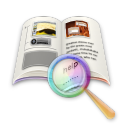Neuroscience

- Googling For Academic Medical Research
Google has announced and is online (beta version) with an academic search engine called "Google Scholar" - which "enables you to search specifically for scholarly literature, including peer-reviewed papers, theses, books, preprints, abstracts and technical...
- Search: Fail
image from findiconsJakob Nielsen's Alertbox had a nice (if sobering) column in March: "Converting Search into Navigation." Nielsen's conclusion: "Users are incredibly bad at finding and researching things on the web. A few years ago, I characterized...
- How Librarians Can Help In Real Life, At #scio13, And More
Librarians are so helpful! (Creative Commons image courtesy of Christchurch City Libraries on Flickr) How do librarians help scientists? If you haven't worked with a good librarian, it's hard to know what we can offer and how we...
- Events I Will Be Leading
I thought some of you might be interested in this Continuing Ed class I'm co-teaching with Terry Plum in November about open access journals: "Open Access and Free Scholarly Resources: What Are They and How Can You Find Them?" Terry will answer these...
- Libraries Need A Good Publicist
I've been on a tear recently about the lack of library advertising & promotion. We should PROMOTE THE H*LL OUT OF LIBRARIES -- our services, our resources (full-text of the New York Times online? Baltimore Sun? Contra Costa Times? We've got it:...
Neuroscience
Find Good Research, Free
 |
| image source: FindIcons |
I recently spoke to Daniel Kreiss' JOMC 244 class: Talk Politics: An Introduction to Political Communication, and I created this library resource guide for further research. I wrote this post for the class tumblr (talkingpolitics.tumblr.com) and am reposting it here.
My presentation had two goals:
- Show researchers how to improve search terms to generate more relevant
- Show researchers how to access free resources for finding scholarly & newspaper articles.
I'd like to highlight some of the tips and resources I shared in class in the hopes that they will be useful to those seeking to incorporate research into their reporting.
Search tips: Generating Good Search Terms (any resource)
- Start with your concept -- such as negative advertising
- Too many results? Put "quotes" around the phrase to require it be searched as a phrase: "negative advertising"
- Add another term or two to your search, to make the results more precise: "negative advertising" AND campaign AND politics
Search tips: More Precise Results (library search engines; won't work in Google)
- If you're searching a library database / search engine, limit the content type to scholarly articles or newspaper articles
- To expand your results, but keep them relevant, try the wildcard operator, *: "negative advertis*" AND campaign* AND politic*, which will search for
- negative advertising; negative advertisements; negative advertisement
- campaign; campaigning; campaigns
- politics; political; politician; politicians
- To expand results further, while still keeping them relevant, use synonyms for one search term:
- "negative advertis*" AND (campaign* OR election*) AND politics
Free Search Resources
Most states in the United States offer multiple free search engines to residents with a library card. I'll focus here on resources for North Carolina residents, but this model exists all over the U.S.!

NC Live offers hundreds of free, full-text resources to North Carolina residents with a library card. Check out this list of search engines to help you find free journals and newspaper articles!
- Academic Search Complete is incredibly useful for scholarly articles, though it also includes newspaper and trade publications. The full-text of many of these articles identified will be available for free; if not, ask your library to get the articles for you (free! via "Interlibrary Loan" magic).
- Newspaper Source Plus has full-text from hundreds of U.S. newspapers, including over 50 from N.C. as well as the New York Times and the Washington Post.
All you need to access these is a free North Carolina library card.
Note: while these resources are "free-to-you," they cost the State Library millions of dollars. Please use them!
You may wonder about Google Scholar, which is Google's way of finding scholarly articles. I have mixed feelings about Google Scholar, which I have documented in a blog post. As long as you know what it does and doesn't have, it's fine to use. But if you need the full-text of an article that's not in Google Scholar, please ask a librarian!
 |
| image from IconArchive |
Which brings me to my last point: Ask a Librarian! Many news organizations have an on-site library, including CNN, the New York Times, and NPR -- if you are lucky enough to work at one of them, please make use of your library resources! Luckily, all you need is a public library card to contact a librarian at your public library for research help. They are happy to help all residents, including journalists. Public universities are also equipped to help members of the public, including journalists.
If you spend a little time up front learning what library resources are available in your community, it will save you lots of time later AND will help you find more relevant material to write about.
- Googling For Academic Medical Research
Google has announced and is online (beta version) with an academic search engine called "Google Scholar" - which "enables you to search specifically for scholarly literature, including peer-reviewed papers, theses, books, preprints, abstracts and technical...
- Search: Fail
image from findiconsJakob Nielsen's Alertbox had a nice (if sobering) column in March: "Converting Search into Navigation." Nielsen's conclusion: "Users are incredibly bad at finding and researching things on the web. A few years ago, I characterized...
- How Librarians Can Help In Real Life, At #scio13, And More
Librarians are so helpful! (Creative Commons image courtesy of Christchurch City Libraries on Flickr) How do librarians help scientists? If you haven't worked with a good librarian, it's hard to know what we can offer and how we...
- Events I Will Be Leading
I thought some of you might be interested in this Continuing Ed class I'm co-teaching with Terry Plum in November about open access journals: "Open Access and Free Scholarly Resources: What Are They and How Can You Find Them?" Terry will answer these...
- Libraries Need A Good Publicist
I've been on a tear recently about the lack of library advertising & promotion. We should PROMOTE THE H*LL OUT OF LIBRARIES -- our services, our resources (full-text of the New York Times online? Baltimore Sun? Contra Costa Times? We've got it:...
